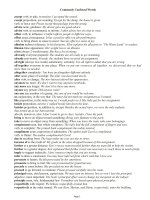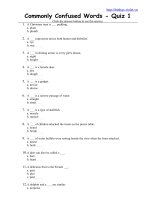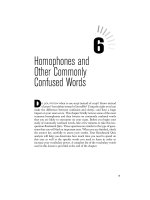Commonly confused expressions 2
Bạn đang xem bản rút gọn của tài liệu. Xem và tải ngay bản đầy đủ của tài liệu tại đây (8.16 KB, 1 trang )
Commonly confused expressions
Read the sentences given below and decide whether they are right or wrong.
1. Let’s keep this between you and I.
2. Two and two is four.
3. Every one of my brothers are married.
4. Leave go of me.
Now let’s analyze the sentences.
The sentence ‘Let’s keep this between you and I’ is wrong. It should be ‘Let’s keep this between you and me.’
Here the pronouns ‘you’ and ‘me’ are the objects of the preposition ‘between’. And objects have to be in the
objective case.
When you put a pronoun after a preposition, make sure that it is in the objective case. The object pronouns are:
me, him, them, her, us, you and it. Note that you and it have the same form in both nominative (subject) case
and the objective case.
2. The sentence ‘Two and Two is four’ is right. However, this doesn’t mean that the sentence ‘Two and two are
four’ is wrong. Both verbs are equally acceptable in this construction. Use whichever verb that has a greater
appeal to your sense of logic.
3. Every one of my brothers are married.
This sentence is wrong. ‘Every’ should be followed by a singular noun and a singular verb.
After ‘everyone of’ we use a plural noun or pronoun, but the verb is singular.
4. Leave go of me.
This sentence is wrong. It should be ‘Let go of me.’
Leave is a popular substitute for let. Let means ‘allow’. Leave means ‘depart’. To let go of somebody is to
release them.
Stay on top of your writing! Download our grammar guide from www.englishgrammar.org to stay up-to-date.
Powered by TCPDF (www.tcpdf.org)









